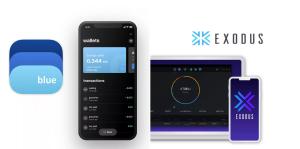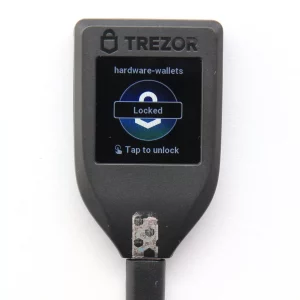When choosing a Bitcoin wallet, factors like features, ease of use, security, and fees play a significant role. In this article, we compare BlueWallet and Exodus, two popular wallets, to help you decide which one suits your needs better.
What is BlueWallet?
BlueWallet is a Bitcoin-only wallet designed for users who prioritize privacy, security, and advanced features. It is an open source wallet and non-custodial, ensuring complete control over your private keys. BlueWallet supports mobile (iOS and Android) and desktop platforms (macOS), offering a modern interface tailored for both beginners and advanced users.
What is Exodus Wallet?
Exodus is a multi-currency wallet that supports over 200 cryptocurrencies, including Bitcoin. While not open source, it offers a visually appealing and user-friendly experience. It is non-custodial and supports both mobile (iOS and Android) and desktop operating systems (Linux, macOS, Windows), making it accessible for a wide range of users.
BlueWallet Features
- Bitcoin-Only: Exclusively supports Bitcoin, avoiding distractions from other cryptocurrencies.
- Open Source: Full transparency, allowing public code review for enhanced trust.
- Lightning Network Support: Requires connection to an external LNDHub for Lightning transactions.
- SegWit Support: Efficient, cheaper, and faster transactions.
- Built-in Exchange Services: Buy and sell Bitcoin directly within BlueWallet.
- Duress Wallets: Decoy wallets for added security.
- Message Signing: Verify wallet ownership securely.
- Batch Transactions: Reduce transaction fees by grouping multiple payments.
- PayJoin: Enhanced privacy with collaborative transactions.
- Fee and Transaction Control: You can bump transactions using Replace-by-fee (RBF) and Child-pays-for-parent (CPFP).
- Coin Control: You can label, freeze or select coins (UTXO) to make a transaction.
- Multisig: Multisig vault for storing large amounts where multiple keys are needed for transactions.
- Hardware Wallet Integration: You can connect with hardware wallets that support PSBT such as Ledger, Trezor, and Coldcard.
- Electrum Server Integration: Connect to personal Bitcoin nodes.
- Buy and Sell Bitcoin: Integrated with Hodl Hodl for non-KYC Bitcoin purchases.
Exodus Features
- Multi-Currency Support: Allows users to store, send, and receive over 200 cryptocurrencies.
- Integrated Exchange: Enables in-app trading and swaps between supported assets.
- Lightning Network Support: Available on mobile devices but limited in certain regions (e.g., unavailable for U.S. users due to third-party restrictions).
- User-Friendly Interface: Known for its polished design and intuitive navigation.
- Trezor Hardware Wallet Integration: Adds an extra layer of security for funds.
- Portfolio Tracker: Helps users monitor their holdings and asset performance.
Ease of Use
BlueWallet offers a clean interface focused on Bitcoin, making it easier for users who prefer simplicity. However, its Lightning Network setup can be challenging for beginners as it requires external configurations.
Exodus, while user-friendly, is not ideal for Bitcoin-only users due to its heavy focus on altcoins and integrated exchange promoting trading. Its multi-asset support can be overwhelming and distracting for beginners and those who simply want to use Bitcoin. For users seeking a wallet dedicated to Bitcoin, without exposure to unnecessary altcoins, BlueWallet is a better alternative.
Privacy and Security
BlueWallet, as an open-source, non-custodial wallet, ensures full control of your private keys. The wallet supports advanced privacy features like PayJoin and Coin Control, making it a strong choice for privacy-conscious users. However, it lacks two-factor authentication (2FA).
Exodus, non-custodial by design, emphasizes user security through private key control. However, its closed-source nature limits transparency, and it does not support advanced privacy features like CoinJoin or multi-signature wallets.
Fees
BlueWallet helps reduce transaction costs with SegWit, batch transactions, and fee adjustment tools like RBF and CPFP. However, external Lightning setups may incur additional fees depending on the provider.
Exodus does not charge wallet fees but applies network fees for transactions. The lack of advanced fee management tools might make it less cost-efficient for active Bitcoin users.
BlueWallet vs Exodus: Quick Glance
| Feature | BlueWallet | Exodus |
|---|---|---|
| Type | Bitcoin-only, non-custodial | Multi-currency, non-custodial |
| Platform Support | iOS, Android, macOS | iOS, Android, Linux, macOS, Windows |
| Open Source | Yes | No |
| Multi-Currency Support | No (Bitcoin only) | Yes (200+ cryptocurrencies) |
| Lightning Network Support | Yes (requires external LNDHub connection) | Yes (limited to mobile and some regions) |
| SegWit Support | Yes | Yes |
| Built-in Exchange Services | Yes (via Hodl Hodl) | Yes (integrated exchange and ShapeShift) |
| Duress Wallet | Yes (for added security) | No |
| Privacy Features | PayJoin, Coin Control, Message Signing | Limited privacy features, no CoinJoin support |
| Multisig Support | Yes (for large fund storage) | No |
| Hardware Wallet Integration | Yes (Ledger, Trezor, Coldcard) | Yes (Trezor only) |
| Portfolio Tracker | No | Yes |
| Fee Management | RBF, CPFP, Batch Transactions | No advanced fee management |
| Security | Open-source, full control of private keys | Non-custodial, lacks 2FA and advanced security |
| Buy and Sell Bitcoin | Yes (via Hodl Hodl) | Yes (via ShapeShift) |
| Customizable Wallet | Yes (Coin Control and Transaction Labels) | No |
Exodus or BlueWallet?
As Bitcoin-only users, we find BlueWallet to be the superior option compared to Exodus. The broad support for over 200 cryptocurrencies and integration with Web3 apps in Exodus, can feel excessive and distracting for those focused exclusively on Bitcoin. BlueWallet’s emphasis on Bitcoin-centric features, open source model, privacy, and user control aligns more closely with the needs of Bitcoin-only users, making it a better fit for those who value simplicity, security, and a dedicated focus on Bitcoin.
Exodus offers an intuitive user interface that works across mobile, desktop, and web browsers, making it accessible to a wide range of users. As a non-custodial wallet, it gives you full control over your private keys, which is a major plus for those who want to retain ownership of their funds. With integrated ShapeShift functionality, Exodus provides in-app trading, and its compatibility with hardware wallets like Trezor adds a layer of security.
However, Exodus’s extensive support for more than 200 cryptocurrencies may overwhelm Bitcoin-only users. This broad focus can detract from the wallet’s overall simplicity, leading to a potentially confusing experience for those who are solely interested in Bitcoin. Additionally, Exodus lacks several important security features, such as two-factor authentication (2FA) and multi-signature approvals. The absence of privacy-enhancing features like CoinJoin or PayJoin may also be a drawback for users who prioritize financial privacy. Finally, as a hot wallet, Exodus remains vulnerable to potential hacking, requiring extra caution during use.
A highlight of Exodus is its integration with the Lightning Network, which allows for faster and cheaper Bitcoin transactions. However, this functionality is currently limited to the mobile version and is unavailable to U.S. users, reducing its potential usefulness for a broader audience.
BlueWallet, by contrast, is a wallet designed with Bitcoin-focused users in mind. Its sleek, user-friendly interface offers a more straightforward experience, especially for those who are dedicated to Bitcoin. The wallet supports multi-language functionality and is compatible with hardware wallets, further enhancing security and accessibility. One standout feature of BlueWallet is its ability to connect to and operate a full node on a personal server. This provides added privacy and security, as you can can rely on your own node to verify transactions, bypassing third-party intermediaries.
Privacy and security is a core strength of BlueWallet. With features like the duress wallet for emergency situations and integration with Hodl Hodl for non-KYC Bitcoin purchases, it caters to users who place a premium on maintaining confidentiality. Since its launch in 2017, BlueWallet has built a reputation for reliability and Bitcoin-centric focus.
Despite our preference for BlueWallet over Exodus and its numerous advantages, it does have some limitations. Notably, BlueWallet does not support the Liquid Network, and its native Lightning functionality relies on third-party services like LNDHub, which may pose challenges for less technical users. Additionally, like Exodus, BlueWallet lacks two-factor authentication (2FA), which could be a drawback for users seeking enhanced security.
In summary, for Bitcoin-only users, BlueWallet offers a more tailored and secure experience than Exodus. Exodus focus on multi-crypto and trading functionalities can be distracting for those committed to Bitcoin. BlueWallet, with its emphasis on privacy, security, and a dedicated Bitcoin experience, is the better fit for users who value a simple, streamlined wallet focused solely on Bitcoin.



























